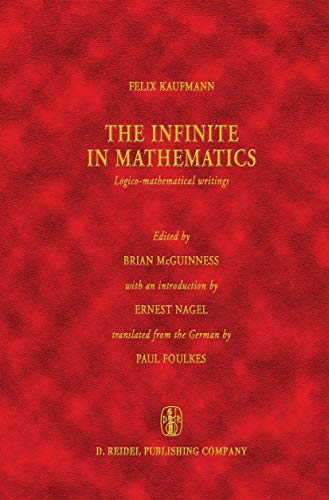The Infinite in Mathematics: Logico-mathematical writings: 9 (Vienna Circle Collection, 9) - Softcover
Buch 11 von 19: Vienna Circle Collection
Inhaltsangabe
The main item in the present volume was published in 1930 under the title Das Unendliche in der Mathematik und seine Ausschaltung. It was at that time the fullest systematic account from the standpoint of Husserl’s phenomenology of what is known as ’finitism’ (also as ’intuitionism’ and ’constructivism’) in mathematics. Since then, important changes have been required in philosophies of mathematics, in part because of Kurt Godel’s epoch-making paper of 1931 which established the essential in completeness of arithmetic. In the light of that finding, a number of the claims made in the book (and in the accompanying articles) are demon strably mistaken. Nevertheless, as a whole it retains much of its original interest and value. It presents the issues in the foundations of mathematics that were under debate when it was written (and in some cases still are); , and it offers one alternative to the currently dominant set-theoretical definitions of the cardinal numbers and other arithmetical concepts. While still a student at the University of Vienna, Felix Kaufmann was greatly impressed by the early philosophical writings (especially by the Logische Untersuchungen) of Edmund Husser!’ He was never an uncritical disciple of Husserl, and he integrated into his mature philosophy ideas from a wide assortment of intellectual sources. But he thought of himself as a phenomenologist, and made frequent use in all his major publications of many of Husserl’s logical and epistemological theses.
Die Inhaltsangabe kann sich auf eine andere Ausgabe dieses Titels beziehen.
Reseña del editor
The main item in the present volume was published in 1930 under the title Das Unendliche in der Mathematik und seine Ausschaltung. It was at that time the fullest systematic account from the standpoint of Husserl's phenomenology of what is known as 'finitism' (also as 'intuitionism' and 'constructivism') in mathematics. Since then, important changes have been required in philosophies of mathematics, in part because of Kurt Godel's epoch-making paper of 1931 which established the essential in completeness of arithmetic. In the light of that finding, a number of the claims made in the book (and in the accompanying articles) are demon strably mistaken. Nevertheless, as a whole it retains much of its original interest and value. It presents the issues in the foundations of mathematics that were under debate when it was written (and in some cases still are); , and it offers one alternative to the currently dominant set-theoretical definitions of the cardinal numbers and other arithmetical concepts. While still a student at the University of Vienna, Felix Kaufmann was greatly impressed by the early philosophical writings (especially by the Logische Untersuchungen) of Edmund Husser!' He was never an uncritical disciple of Husserl, and he integrated into his mature philosophy ideas from a wide assortment of intellectual sources. But he thought of himself as a phenomenologist, and made frequent use in all his major publications of many of Husserl's logical and epistemological theses.
„Über diesen Titel“ kann sich auf eine andere Ausgabe dieses Titels beziehen.
Weitere beliebte Ausgaben desselben Titels
Suchergebnisse für The Infinite in Mathematics: Logico-mathematical writings:...
The Infinite in Mathematics, Logico-Mathematical Writings
Anbieter: Oxfam Bookshop Gent, Gent, Belgien
Hardcover. Zustand: Good. Zustand des Schutzumschlags: Fine. 1st Edition. XVII - 235 pp. D. Reidel Publishing Company, Dordrecht, 1978. First Edition. Introduction by Ernest Nagel. Hardcover. Black with golden lettering. Good/very good condition. Clean inside. Jacket has some cuts. Ex. library of the Library of the Ghent University: usual labels, stamps and numbers. Artikel-Nr. 011884
Gebraucht kaufen
Anzahl: 1 verfügbar
The Infinite in Mathematics | Logico-mathematical writings
Anbieter: preigu, Osnabrück, Deutschland
Taschenbuch. Zustand: Neu. The Infinite in Mathematics | Logico-mathematical writings | Felix Kaufmann | Taschenbuch | xvii | Englisch | 1978 | Springer | EAN 9789027708489 | Verantwortliche Person für die EU: Springer Verlag GmbH, Tiergartenstr. 17, 69121 Heidelberg, juergen[dot]hartmann[at]springer[dot]com | Anbieter: preigu. Artikel-Nr. 107090717
Neu kaufen
Anzahl: 5 verfügbar
The Infinite in Mathematics : Logico-mathematical writings
Anbieter: AHA-BUCH GmbH, Einbeck, Deutschland
Taschenbuch. Zustand: Neu. Druck auf Anfrage Neuware - Printed after ordering - The main item in the present volume was published in 1930 under the title Das Unendliche in der Mathematik und seine Ausschaltung. It was at that time the fullest systematic account from the standpoint of Husserl's phenomenology of what is known as 'finitism' (also as 'intuitionism' and 'constructivism') in mathematics. Since then, important changes have been required in philosophies of mathematics, in part because of Kurt Godel's epoch-making paper of 1931 which established the essential in completeness of arithmetic. In the light of that finding, a number of the claims made in the book (and in the accompanying articles) are demon strably mistaken. Nevertheless, as a whole it retains much of its original interest and value. It presents the issues in the foundations of mathematics that were under debate when it was written (and in some cases still are); , and it offers one alternative to the currently dominant set-theoretical definitions of the cardinal numbers and other arithmetical concepts. While still a student at the University of Vienna, Felix Kaufmann was greatly impressed by the early philosophical writings (especially by the Logische Untersuchungen) of Edmund Husser!' He was never an uncritical disciple of Husserl, and he integrated into his mature philosophy ideas from a wide assortment of intellectual sources. But he thought of himself as a phenomenologist, and made frequent use in all his major publications of many of Husserl's logical and epistemological theses. Artikel-Nr. 9789027708489
Neu kaufen
Anzahl: 1 verfügbar

